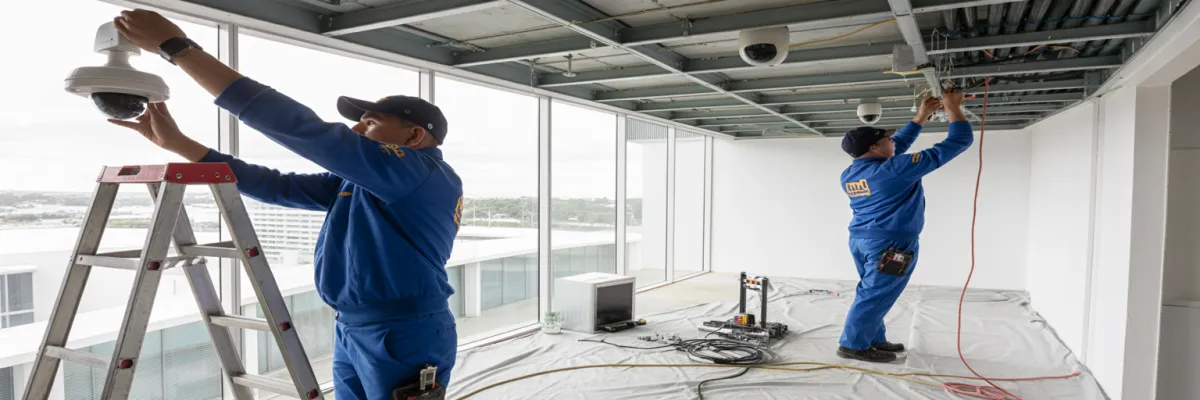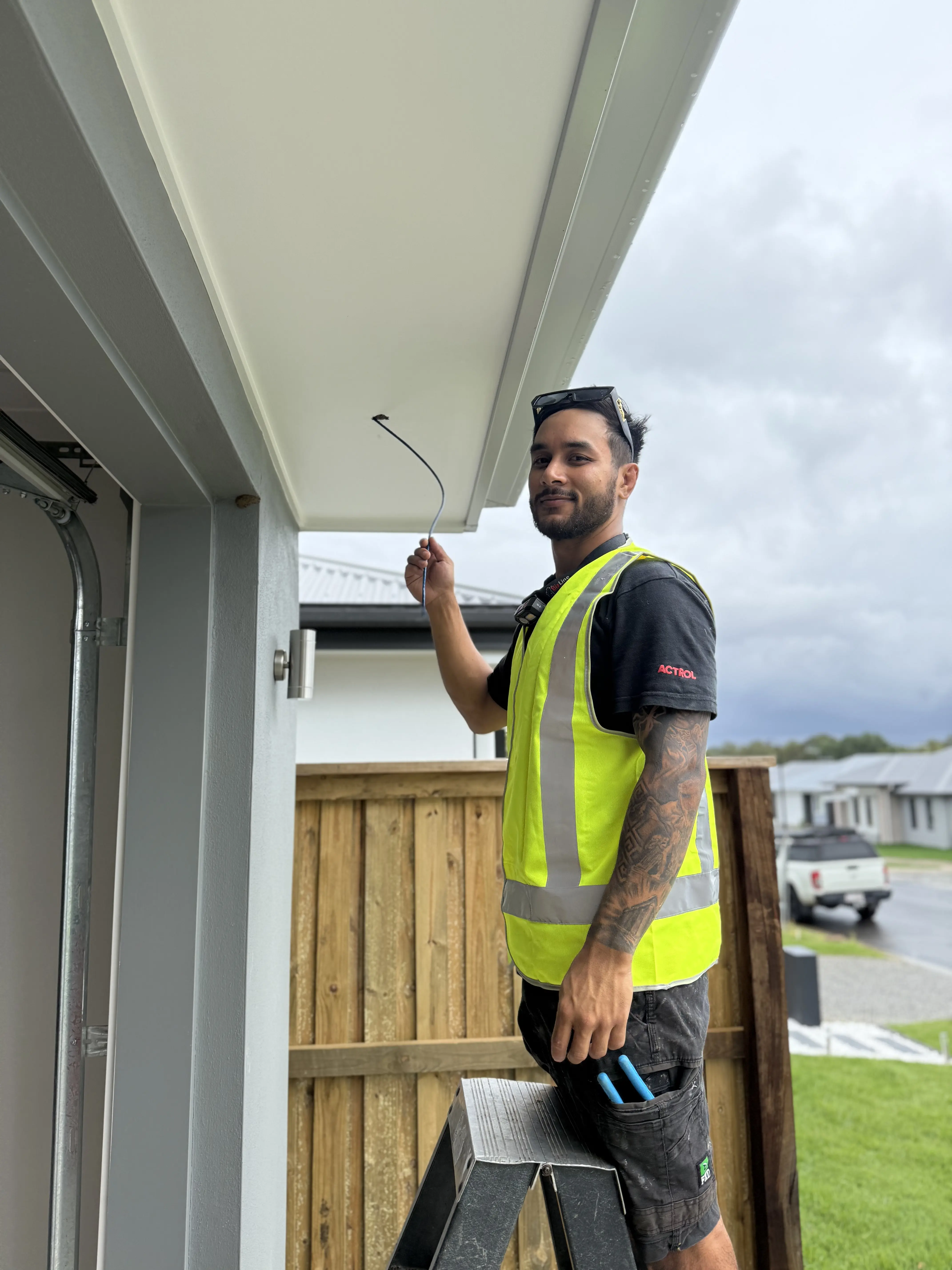
How to Install a CCTV System for Your Commercial Property: Brisbane Business Owner's Complete Guide
A Brisbane warehouse owner recently discovered $45,000 worth of equipment missing from his Rocklea facility – and his outdated security cameras captured nothing but blurry shadows. This scenario plays out across Brisbane commercial properties every week, costing businesses millions in preventable losses.
As a Brisbane business owner, you understand that protecting your commercial property isn't just about preventing theft – it's about safeguarding your livelihood, ensuring employee safety, and meeting insurance requirements. With commercial crime rates climbing across Brisbane's industrial districts and CBD areas, many business owners are finding themselves caught between rising security risks and other operational challenges.
Installing a professional CCTV system is no longer optional – it's business infrastructure that's as important as your internet connection or electrical systems. But here's what many Brisbane business owners discover: there's a massive difference between buying some cameras online and installing a system that actually protects your business when you need it most.
This guide walks you through everything you need to know about installing CCTV systems for commercial properties, from initial planning to ongoing maintenance. You'll discover system types, legal requirements, and how to choose the right installation partner for your Brisbane business. Most importantly, you'll learn how to avoid the expensive mistakes that leave businesses vulnerable and insurance claims rejected.

Planning Your Commercial CCTV Installation: Assessment and Requirements
Before you buy a single camera, you need to understand what you're actually protecting. I've seen too many Brisbane business owners jump straight into buying equipment without doing the groundwork – and they always end up with gaps in their coverage later.
The smart approach starts with a proper security risk assessment. This isn't about walking around your property with a clipboard – it's about thinking like someone who wants to steal from you or harm your business.
Conducting a Security Risk Assessment for Your Property
Your security assessment needs to answer three questions: What are you protecting? Who might want to take it? And how would they get access?
Start with your valuable assets. For retail stores, that's obviously inventory and cash register areas, but don't forget your back office, staff areas, and customer spaces where incidents could happen. Warehouse operations have different risks - high-value inventory, loading docks, equipment storage areas, and dark corners where someone could hide until after hours.
Professional offices might not have obvious theft targets, but you've got client confidentiality issues, expensive equipment, and liability concerns about who's in your building after hours.
Brisbane's industrial areas get pretty quiet after 6 PM, which gives criminals more time to work. CBD locations might have more foot traffic, but that also means more opportunities for opportunistic theft during business hours.
Identifying Critical Coverage Areas and Blind Spots
Your entry and exit points are obvious, but you also need coverage on approach paths. If someone's casing your business, they're checking out the sides and back to see how they can get in without being seen.
Internal coverage depends on your business type. Retail stores need sight lines that cover high-theft merchandise and customer interaction areas. Warehouses need coverage of storage areas, positioned so staff aren't constantly walking in front of cameras during normal operations.
Don't forget about parking areas. That's where a lot of after-hours break-ins start, and it's where employee safety becomes an issue. The blind spots are what'll cost you - areas where your current lighting is poor, where building features create shadows, or where someone could approach without being seen.
Camera Placement Strategy
The rule isn't "more cameras equals better security." It's about smart placement that gives you overlapping coverage without creating equipment that's expensive to maintain.
Your camera placement strategy should create zones of coverage. Zone one is your perimeter – first warning that someone's approaching. Zone two is your entry points – doors, windows, loading docks. Zone three is your high-value areas – where you keep inventory or sensitive information.
Height and angle matter more than most people realize. Too high and you can't see faces clearly. Too low and they're easy to disable. The sweet spot for most commercial applications is 8-10 feet high, angled down at about 30 degrees.
Types of Commercial CCTV Systems: Choosing the Right Technology
Walking into a security equipment supplier can feel overwhelming. IP cameras, NVRs, analog systems, cloud storage – but the key is matching the technology to your actual business needs, not buying equipment based on specifications alone.
Analog vs Digital IP Camera Systems
Analog systems send video signals through coaxial cables to a central recording device. Digital IP systems send data over your computer network, just like your internet connection.
Most security companies will tell you analog is outdated, but that's not always true for Brisbane businesses. If you've got an existing analog system that's working adequately, and you're mainly looking to add cameras or upgrade recording equipment, sticking with analog might make practical sense.
The real advantage of analog is simplicity. One cable carries the video signal, power usually comes from a central location, and there's not much that can go wrong with the networking side.
But IP systems give you options that analog can't match. Higher resolution, better night vision, remote camera access, and integration with other business systems. If you're installing a new system from scratch, or need to access cameras from multiple locations, IP is probably the way to go.
HD, 4K, and Camera Resolution Options
HD cameras (1080p) are still the sweet spot for most Brisbane commercial applications. They give you clear enough images to identify faces from 10-15 meters away, which covers most business situations.
4K cameras provide incredibly detailed images, but they also create files that are four times larger than HD. That means more storage requirements, faster internet connections, and more powerful recording equipment. They make sense if you're monitoring high-value areas where you need fine details, like jewelry displays or pharmaceutical storage.
The practical approach for Brisbane businesses is often a mixed system. Use 4K cameras for your most important areas – main entrances, cash registers, high-value storage – and HD for general coverage areas.
Storage Options: Cloud vs Local Systems
Local NVR systems store everything on-site. You own the equipment, you control the data, and once you've purchased the system, there are no ongoing monthly fees. For Brisbane businesses that want complete control over their security footage, local storage makes sense.
The downside of local storage is that if someone steals your recording equipment or damages it during a break-in, you lose your evidence. You can only access footage from the location where the NVR is installed, unless you set up remote access.
Cloud storage puts your video footage on servers managed by your security company or cloud service provider. You can access it from anywhere with an internet connection, it's backed up automatically, and it can't be stolen with your other equipment.
The hybrid approach works well for many businesses. Store recent footage locally for quick access, and automatically back up important recordings to the cloud.

Professional Installation vs DIY: Making the Right Choice
Every week, I get calls from Brisbane business owners who tried to install their own CCTV system and now need help fixing what went wrong. The conversation usually starts with "I thought this would be straightforward" and ends with them needing professional help to address issues they didn't anticipate.
The DIY security market makes it look easy. Buy some cameras online, download an app, and you're done. But commercial security isn't the same as setting up a home system. Your business has different risks, different legal requirements, and different consequences when things go wrong.
Benefits of Professional Installation Services
Professional installers bring experience that you can't get from YouTube videos or instruction manuals. They've seen what works in Brisbane's climate, they know how different building types affect camera placement, and they understand the legal requirements that could get you in trouble if you miss them.
The site assessment alone provides significant value. Experienced installers will spot security vulnerabilities you didn't know existed, recommend camera positions that maximize coverage while minimizing equipment needs, and design systems that can grow with your business.
Professional installation also means professional-grade equipment. The cameras and recording systems that installers use are designed for commercial applications – they're built to run 24/7, they handle Brisbane's humidity and temperature changes better, and they come with warranties that provide genuine protection when equipment fails.
Hidden Issues with DIY Installation Attempts
The most problematic DIY mistakes aren't obvious until months after installation. Poor camera placement might leave blind spots that criminals can exploit. Inadequate weatherproofing might not show problems until the first big storm. Network configuration issues might not appear until your system crashes during a critical incident.
Equipment compatibility is another issue. Not all cameras work with all recording systems, and not all systems integrate properly with business networks or mobile access applications.
Cable runs are where most DIY installations go wrong. Running power and data cables through commercial buildings requires understanding electrical codes, building structures, and safety requirements. Incorrect cable installation can create fire hazards, violate building codes, or simply fail when you need the system most.
Time requirements matter too. A professional installation team can typically complete a commercial system in 1-3 days. DIY installations often stretch over weeks or months as business owners try to fit installation work around running their businesses.
Warranty and Ongoing Support Considerations
Professional installations come with comprehensive warranties that cover both equipment and workmanship. If a camera fails, if cables are damaged, or if the system doesn't perform as promised, professional installers will fix the problems.
Equipment warranties are different for professional-grade systems versus consumer equipment. Commercial cameras and recording systems typically come with 3-5 year warranties and local service support. Consumer equipment often has limited warranties and no local service options.
The relationship with a professional installer continues long after the initial installation. They become your security technology partner, helping you adapt your system as your business needs change and providing expertise when you're planning expansions or dealing with security incidents.
For Brisbane business owners, this ongoing relationship is particularly valuable. Local installers understand the specific challenges of operating in Brisbane's climate and business environment. They can provide rapid response when you have problems and they understand local compliance requirements that might affect your system.
Ready to protect your Brisbane commercial property with a professional CCTV system? Our certified installation team has helped hundreds of local businesses secure their assets, comply with legal requirements, and gain peace of mind. Call us: +61409809577
Get your free security assessment and custom installation quote – contact us today to discover how the right CCTV system can protect your business investment.


